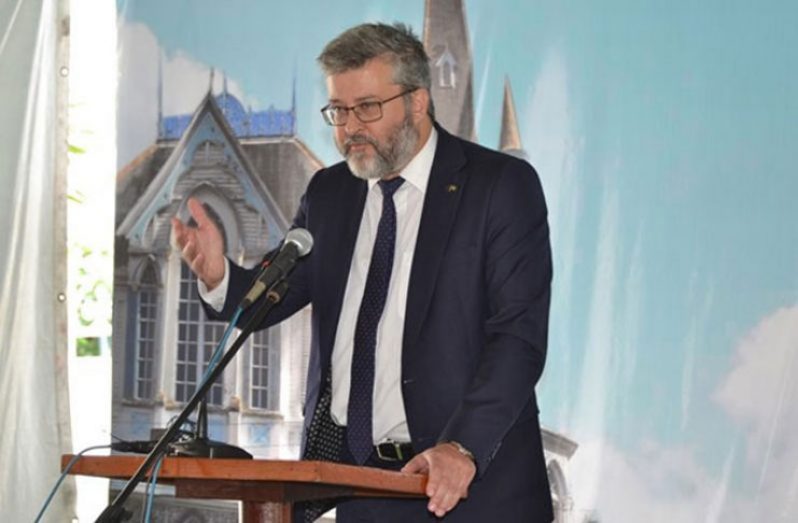— Ambassador Canto urges Guyana not to solely depend on oil, shift to renewable energy
GUYANA has already raked in US$150 million through its fledgling oil and gas sector and this figure is expected to grow tremendously in the coming years. This wealth that would be generated from oil and gas sector should reach every citizen of this nation, said Ambassador of the European Union (EU) to Guyana, Fernando Ponz Canto.
The country officially started pumping oil late 2019, paving the way for new opportunities and wealth which could benefit everyone for years to come.
“It is very good that Guyana has the historical opportunity to increase prosperity, but it is important that this increase benefits the citizens and cascades down to everyone, so that wealth is not concentrated in a few places,” said Ambassador Canto in an exclusive interview with the Guyana Chronicle on Saturday.
Several member states of the EU are oil producing nations including Italy and Germany, so the bloc has garnered a wealth of knowledge in this area, knowledge and experience which the bloc is ready to share with Guyana, said the ambassador.
To this end, the ambassador said it is fundamental for there to be inclusiveness, in the sense that wealth should reach citizens; otherwise, the country could experience what is known as the “natural resource curse”.
“This (the curse) is a major risk and everything that can be done to avoid that would be extremely important, and we are here and ready to exchange best practices,” said Ambassador Canto, adding: “We made a few mistakes ourselves, but hopefully man learns and we can exchange and dialogue in a way that we can learn from the good things you are doing as well.”
The ambassador said another key focus of the government should be a diversified economy, as the EU itself has a motto, “united in diversity”, which emphasises the importance of promoting diversification and not being dependent on one resource or sector.
“We do not depend on only one resource because it is a recipe for problems,” said Ambassador Canto, noting that diversification, once practiced, must cover everything from internal diversity to diversification of economic sectors. By being diverse, the country would be able to avoid the trap of economic dependence,” said the ambassador.
DECLINE
Guyana’s economy is diverse in outlook but the non-oil economy recorded a decline in performance in the first half of this year.
In presenting quantitative data on the performance of the country, Vice-President, Bharrat Jagdeo had said the oil economy grew by 45.9 per cent, but the non-oil economy, which comprises the traditional, labour-intensive sectors, shrunk by 4.9 per cent in the first half of the year.
“If you take out oil and gas, economic activities shrunk by nearly five per cent for the first half of the year… this shows that these sectors require a lot of help, in order to resume positive growth,” said Jagdeo in a recent report.
Coming off of a good run in 2019, with recorded economic growth of 4.7 per cent, Guyana’s continued progression and transformation was inevitably halted by the COVID-19 pandemic, which has so far infected 2,269 persons and caused 65 deaths.
The necessary restrictions in place to curtail the spread of the disease, as seen in countries across the world, has “slowed down” the economy because businesses either reduced their productive hours or are closed indefinitely, and the public sector has also scaled down its operations for the time being.
Unlike other countries, Guyana was faced with the effects of a protracted electoral process which started on March 2, 2020 and ended only on August 2, 2020.
But even as the country looks to “bounce back” and focus on rebuilding its economy, using oil wealth and other resources, Ambassador Canto advised government to prepare for the imminent shift to renewable energy, as the world is slowly moving away from the dependence on fossil fuel.
“We are in a moment of climate emergency… you (Guyana) have to move and make sure you continue towards environmental objectives we share… I am encouraged by what I have heard from Guyanese interlocutors that the country will stick to the Paris agreement,” said the ambassador.
Recently, the President of the European Commission, Ursula von der Leyen, in a State of the Union speech, said the EU is committed to reducing more than half of its carbon emissions within the next few years.
Ambassador Canto believes that Guyana, while benefitting from new-found oil wealth, should also join the effort and promote the use of cleaner energy.











